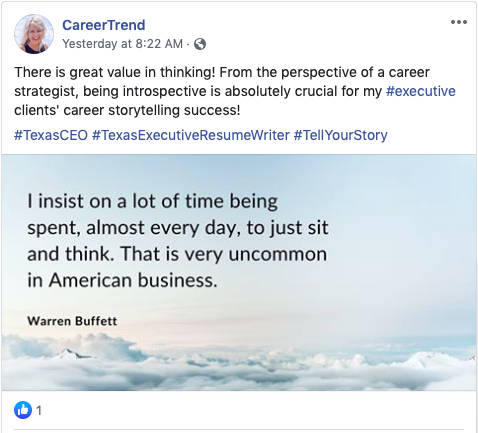- Re-evaluate your marketing plan. Wait. You do have a marketing plan, right? A written document that outlines your vision for your resume writing business, your goals and objectives, who your ideal target customer is, and the "5 Ps" (what Products/services you'll offer; your Pricing strategy; your Place/distribution plans -- i.e., whether you'll work with clients in person or virtually, or both; how you plan to Promote your business, and People involved -- you, and/or subcontractors or virtual assistants who will serve your clients). You'll also want to outline the marketing tactics you plan to use (including your marketing budget) and a schedule for implementing the tactics.
Every few years it is necessary to take a look at your marketing plan with new eyes. If you're not as busy as you'd like to be, you should evaluate your marketing plan every few months. What are you doing now? What's working? What's not? How can you revamp your existing marketing tools (articles, blogging, public speaking) and employ some new ones (social media, teleseminars/webinars)?
- Become a social networker. Speaking of social media, Twitter and Facebook are becoming valuable tools for a lot of resume writers, who have used the social media sites to position themselves as expert resources for clients, recruiters, and the media.
- Advertise your business on your personal Facebook page. I came across a resume writer last week who just made the announcement that she was no longer going to post any business-related posts on her personal page. Huge mistake! Facebook has just changed their algorithm again, and it's resulting in less visibility for Business Pages. The new "Subscribe" feature also makes it easy for "non-friends" to follow what you're up to -- and posting business content on your personal profile is what they're usually looking for! Post links to new content on your website and other promotional links that friends and family can view and share. But don't neglect your fan page for your resume writing business. It's still a valuable tool. Encourage current clients to sign up and tune in for special information or offers that they won't find anywhere else.
- Don't neglect offline tools. For many resume writers, a significant portion of your business is still local. Just because more and more clients are finding you online doesn't mean that you should neglect offline tools, like direct marketing, flyersm and promotional items.
- Video marketing. People love to watch informative videos online. You can take what you know and turn it into a visual presentation that immediately gives new clients a picture of who you are and what you do. I am loving doing "Desktop Demos" -- on my Mac, I just use QuickTime and a USB headset/microphone to do a quick video. It saves as a .MOV file, and I upload it to YouTube so anyone can view it. Easy!! Check out this video I did last week on how to use BeAResumeWriter.com's Pass-Along Materials.
- Create a press release. Are you about to offer a new service or product? (LinkedIn profile development, your new career membership site, salary negotiation coaching), Create a press release that will attract new clients to your business. Use a press release service and be sure that your content is SEO optimized. (Want more ideas on how to use the media to attract new clients? Check out the recording of my teleseminar on "Feed the Media" in the Free Level Resources section of BeAResumeWriter.com. Not a member of BeAResumeWriter.com? Click on the "Become a Member" tab and apply for your free membership)
- Take a fresh look at your website. Are you making it easy for prospective clients to understand how they should work with you? You need two things on your website: A clear "call to action" that tells clients exactly what you want them to do to start working with you (call? send their existing resume?) AND you need a way to capture information about folks who visit your site but aren't ready to start working with you yet. (A free report delivered via autoresponder usually fits the bill.)
These are just a few ways you can attract new clients for your resume writing business.



















